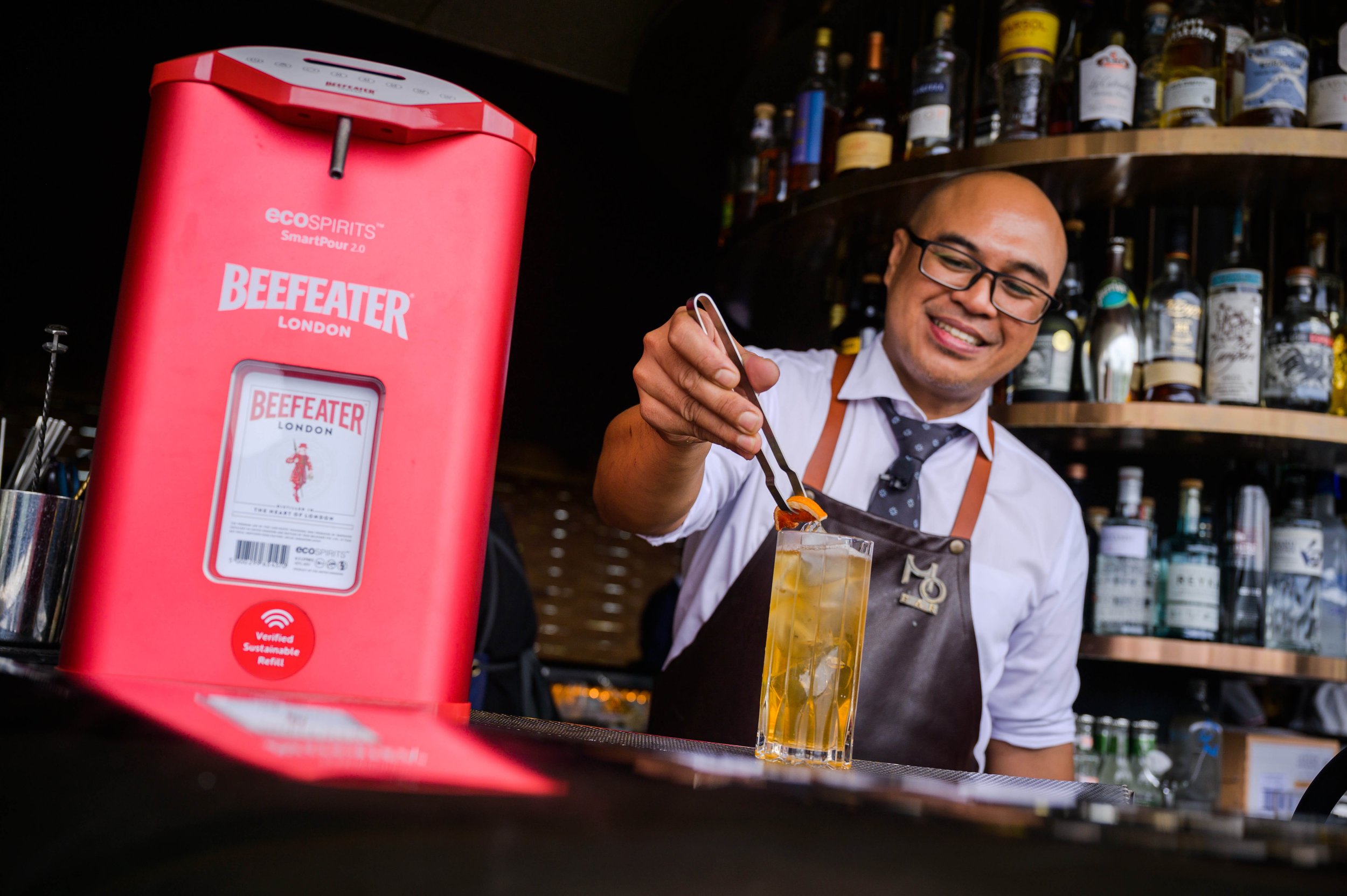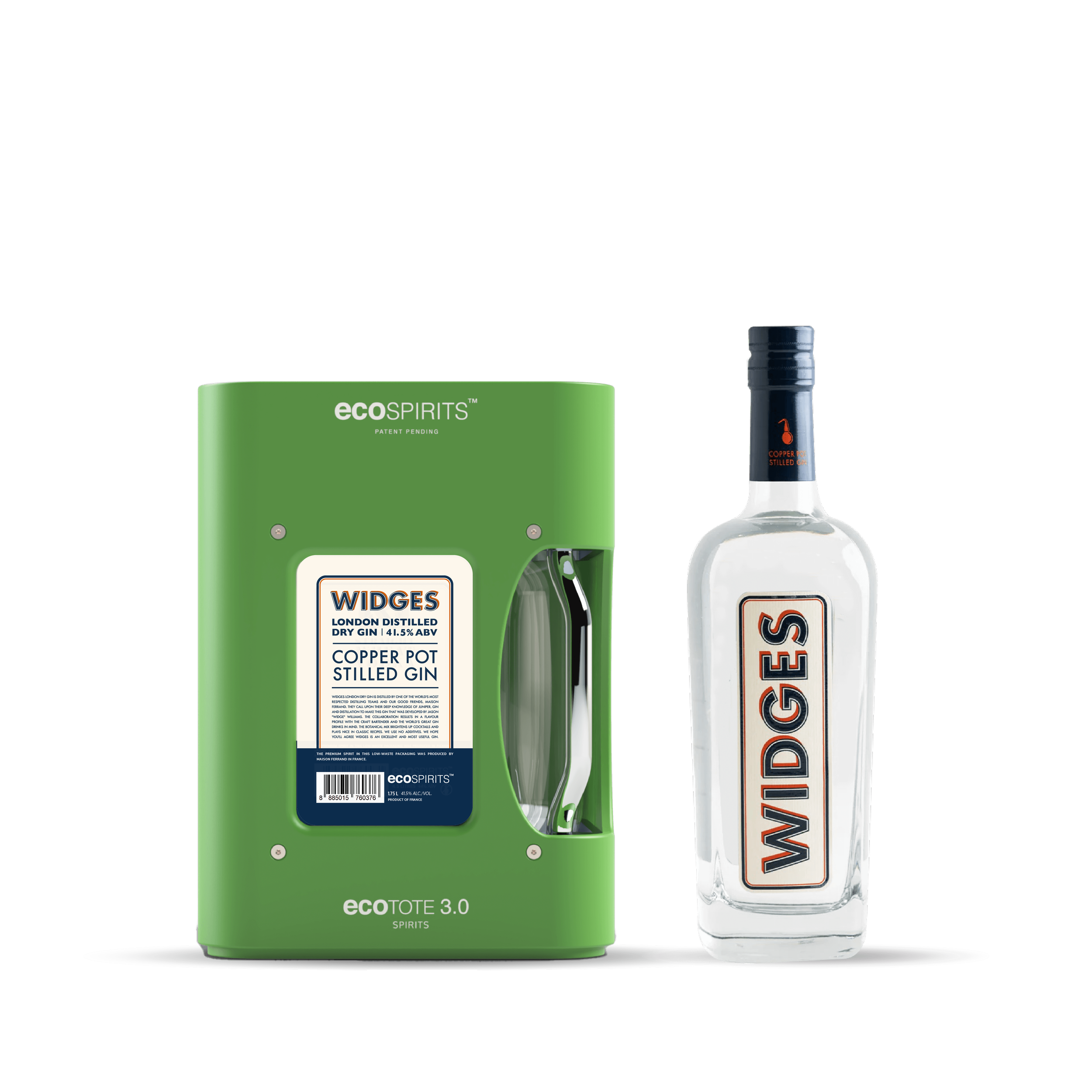A Big Step Toward Sustainable Sipping: ecoSPIRITS
On one end, you have bartenders using paper straws, dehydrated citrus wheel garnishes, and recycled cardboard drink coasters in order to be more sustainable on premise. On the other end, some spirits distillers have been embracing lower-carbon practices such as using solar power, recycling heat, and reducing water use. But in between the distillery and the bar, producers ship fancy heavy designer glass bottles of their spirits all over the world. Those bottles are used a single time and then discarded or put into the recycling bin to be crushed up and reprocessed.
The Problem with Glass Bottles
Having a custom bottle is an important part of marketing for spirits brands, especially when those bottles are sold at retail. But at a busy nightclub where bartenders are slinging hundreds of Vodka Red Bulls every night, most customers never see the bottle, and all those bottles still end up in the bin at the end of the night. In other bars, cocktails are fully or partially batched to speed up service and again, the designer bottles are often not even visible to the customer.
A Solution
In the middle between the spirits producers and the bartenders, one company has found a very specific niche in which to make a big move in sustainability. ecoSPIRITS is a company that evolved out of a bar group in Singapore but has since gone global with a very good idea.
Ecospirits receives spirits in bulk containers at their facilities (ecoPLANTs), fills them into their custom-made reusable totes (ecoTOTES) and then a distributor brings them to on-premise accounts. The distributor also picks up empties for refill back at the Ecoplant. (We’ll write these words with typical capitalization going forward to make it easier on your eyes.) There is no single use glass in the process and none in the bin at the end of the night.
How it Works
The way it works is quite interesting. Spirits are not bottled at their source, let’s say in France for example, but shipped in bulk plastic totes to one of Ecospirits’ Ecoplants, let’s say in Florida. In most countries in which the company operates, the Ecototes are 4.5 liters (6, 750ml bottles’ worth), but due to US legal bottle sizes, they are 1.75-liter totes here. Ecototes are refillable glass bottles (as manufacturers prefer) inside a protective casing that also makes them stackable.
When those totes are empty, they are returned to the distributor and sent back to the Ecoplant to be thoroughly sterilized and refilled. The totes themselves are outfitted with monitors and tracking that helps both traceability, accountability, and with inventory. They also have automatic pour spouts that dispense in specific volumes- such as a few ounces or a 750ml bottle’s worth. They can be kept out of site in the stock room or made into conversation pieces with placement on the back bar.
While a few specific wine and spirits producers have attempted bottle refill initiatives around the US, these all rely on consumers or bars individually returning those bottles to the production facilities for refill or exchange. Thus, these systems are pretty limited in their geographical range, as well as in the range of products that can be refilled into any particular bottle.
Producers Using the System & Producers that Can’t (yet)
Instead, Ecospirits works with many different brands from ones owned by huge companies like Pernod-Ricard’s Beefeater Gin, Havana Club Rum, and Absolut Vodka to smaller brands like Avallen Calvados, Compass Box Whisky and Roots Marlborough Gin. To be available in a particular market, a brand’s owner must agree to make the product available for distribution in this system and ship their liquid in bulk to the Ecoplant. Ecospirits partners with a local distributor that takes orders and delivers totes to accounts, as well as picks up empties to go back to the plant.
Not every type of spirit is a fit for this system at the moment. Single malt scotch whiskies and 100% agave tequilas, for example, must be bottled in their home countries, so they can’t be shipped in bulk and bottled on foreign ground.
Geographical Limitations
Another complexity is that the refill facilities are best located near shipping ports to receive the bulk liquids. Thus, most distribution of the Ecototes is limited to venues that are within driving range of the coastal refill plants, rather than throughout the entire country. In the United States, the first two Ecoplants are located in Los Angeles (and the distribution region includes all the way to Orange County and San Diego), and Miami. It might be a while before they get to Chicago, but it could happen. Ecospirits has plans to bring additional Ecoplants online in the United States in the second half of 2023.
Obviously, not every single spirit and liqueur from every part of the world is a good fit for this system. Spirits used most often at bars – the “well” spirits – make the most sense as they’re reached for the most often, and don’t sit on the back bar shelves as displays. Just think of how many Aviations you’d have to serve each week to make a 1.75 liter tote of creme de violette worthwhile!
Deconstructing Cocktails
But thinking about specific cocktails and their ingredients is a specialty of the company. For example, the Raffles in Singapore serves up to 1200 Singapore Slings to tourists each day, so Ecospirits worked to ensure that all of the alcoholic ingredients in the drink were available in Ecototes. These include Widges London Dry Gin, Luxardo Sangue Morlacco Cherry Liqueur, and Pierre Ferrand Dry Curaçao. Ecospirits says that in the first year in 2018, they were able to save tens of thousands of glass bottles just for this one drink at this one bar.
They have their eyes on a few other famous drinks too. Zdenek Kastanek, Managing Director for Ecospirits USA, named the Irish Coffee at The Buena Vista in San Francisco and the Miami Vice at the Fontainebleau Miami as drinks on his future wish list.
Spirits brands available with the system can vary by country, and Ecospirits frequently issues press releases about new brands signing up for their system. Diageo, Pernod-Ricard, and Remy Cointreau brands are available in different markets. For the United States, brands who’ve already signed up include Tried & True Vodka, Los Arcos Destilado de Agave, La Travesia Mezcal, Widges Gin, Mackintosh Whisky, and Candela Rum.
Sustainability initiatives are needed at the bar and at spirits manufacturing plants, and Ecospirits has found an innovative sweet spot to make a further positive impact in between the two.




